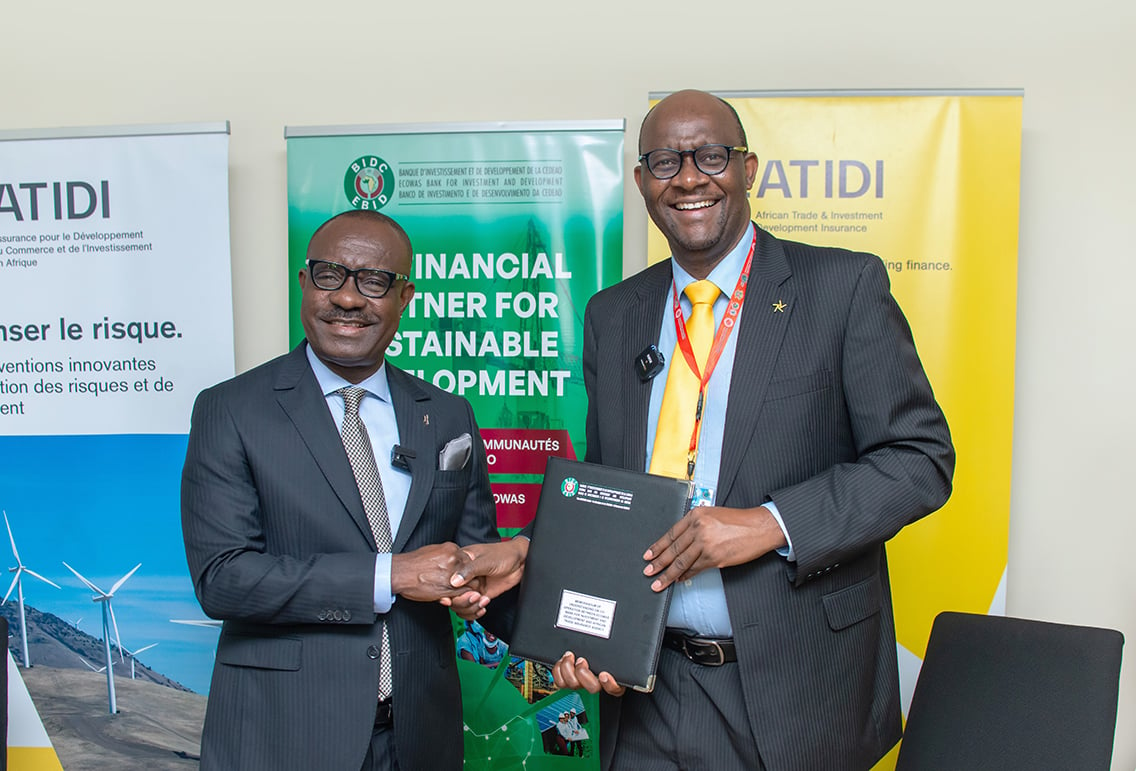This article was produced with the support of ECOWAS Bank for Investment and Development
The private sector in west Africa is poised for a fresh boost after the ECOWAS Bank for Investment and Development (EBID) and the African Trade & Investment Development Insurance (ATIDI) inked an agreement to support economic activity in the region.
Signed on the sidelines of the African Development Bank annual meetings in Abidjan, the memorandum of understanding (MoU) provides a general framework for the two institutions to collaboratively de-risk private sector transactions in West Africa.
This new partnership is set to enhance efforts to attract private investment to the region, with a focus on expanding industrial capabilities, accelerating infrastructure development, and building regional value chains.
“In partnering with ATIDI, the Bank takes yet another step towards enhancing its risk management strategy, which will enable it to secure competitive resources to finance transformative development projects across West Africa,” said Dr George Agyekum Donkor, President and Chairman of the board of directors of EBID, during the signing ceremony.
Mitigating risks
Dr Donkor highlighted the various macroeconomic pressures facing countries in the region, outlining challenges such as debt distress, high funding costs, high non-performing loans in the private sector, and the threat of credit downgrades by credit ratings agencies.
“Private sector non-performing loan (NPL) ratios in some countries have reached 15-20% due to various pressures, far above global averages,” he elaborated.
He also cited security and political challenges in the region, noting that this had adversely impacted the risk profile of some nations. “As a DFI [development finance institution], EBID invests in areas where many commercial financiers would hesitate. Our objective is not only to drive impact but to do so sustainably while earning the trust of global markets. To this end, credit risk insurance is not a luxury – it’s a necessity,” he said.
“Engaging partners like ATIDI to provide credit insurance options helps to mitigate the challenges mentioned by reducing the Bank’s exposure to sovereign default risk while strengthening its risk management framework, which translates into better capital adequacy and more stable asset quality,” he added.
Manuel Moses, CEO of ATIDI, welcomed the partnership, stating that ATIDI “will spare no effort to make the partnership a dynamic, prolific and successful one.”
“This MoU represents a concrete step towards enhancing access to finance for the private sector, particularly for SMEs [small and medium enterprises] which are the backbone of Africa’s economy,” he said. “Importantly, the MoU reflects the need for strategic collaboration among key players in development finance. Only by pooling their assets can institutions such as EBID and ATIDI reach the scale where they can achieve their planned development impact and enable transformational investment for the benefit of ECOWAS citizens,” he added.
Expanding the loan book
The MoU comes at a time when EBID has substantially grown its loan book. In 2024, the Bank disbursed $473.8m – 24% of its balance sheet – a significant increase from 16.5% the previous year. As of 2024, EBID had disbursed a cumulative $2.3bn directly to SMEs, women entrepreneurs, and major industrial projects, creating over 1m jobs.
In April, the Board of Directors of the Bank approved $230m and XOF 10bn for strategic regional initiatives, including a $50m credit line to Sterling Bank Nigeria to support SMEs across sectors such as health, education, and renewable energy; a XOF 10bn facility to Benin Cashew SA to co-finance cashew nut processing; and a $180m facility to Mota-Engil Nigeria for the Kano-Maradi rail line, a vital link between Nigeria and Niger expected to generate over 100,000 jobs during construction and 20,000 permanent positions thereafter.
Dr Donkor expressed confidence that the MoU with ATIDI would help sustain this momentum by de-risking transactions and crowding in additional financing from the private sector.
“Credit risk insurance gives us the tools to take calculated risks. It is my hope that this partnership will expand our reach and enable us to finance West Africa’s future.”
“West Africa is on a path of transformational growth. With a population set to exceed 500m by 2040, and urbanisation driving new infrastructure, energy, and digital demands, the pressure to finance sustainable development has never been higher,” he added.
Founded in 2001 by African states with support from the World Bank, ATIDI provides political risk, credit, and surety insurance to mitigate risks for companies doing business in Africa. As of 2024, its instruments had helped facilitate trade and investments over $88bn in Africa. Over the years, the institution has maintained stellar credit ratings, having secured an A/stable rating for financial strength and counterparty credit by S&P and an A2/positive rating from Moody’s.
“We help mitigate real and perceived risks, offering investors the security they need to move forward with projects and investments in Africa. We work closely with international and local stakeholders, both public and private, to create an environment of trust and stability, ultimately making Africa a more attractive investment destination,” Moses told African Banker in a recent interview.

 Sign in with Google
Sign in with Google 



